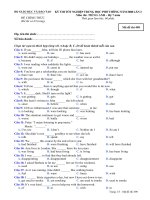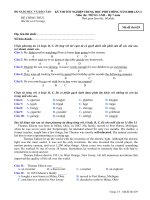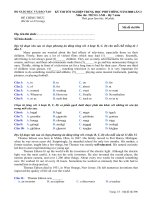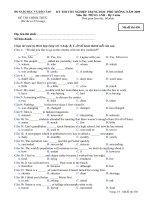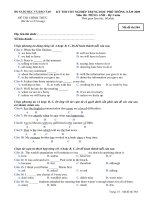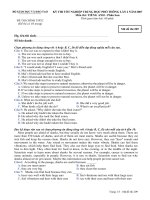Anas Ma Economics Uwaterloo
Bạn đang xem bản rút gọn của tài liệu. Xem và tải ngay bản đầy đủ của tài liệu tại đây (267.96 KB, 17 trang )
Graduate School
MA in Economics at U Waterloo
Ana Ferrer*
Associate Chair, Graduate Studies
University of Waterloo
2015 - 2016
Should I go to Graduate School?
• If you have the marks - an MA in Economics makes a
lot of sense.
• Significantly higher earnings ($45,000-$80,000) relative
to an undergraduate honour’s degree in economics
• Greater responsibility and more interesting work
• Relatively low opportunity costs. Most MA programs
consist of 8 months of coursework and funding is
available.
• There are, of course, costs. Be certain that you want
to pursue economics as a profession. Switching
careers with an undergraduate degree is definitely
easier.
Should I do it?
• Graduate programs offer many possibilities to
apply your degree in the public or private sectors
as policy advisors, research economists, or
consultants.
• Crown corporation (Ontario Hydro) responsible for
designing tariffs aimed at more efficient electricity
consumption
• Statistics Canada develop research necessary to
inform and support public policies in other government
department
• Financial institutions and insurance companies
forecasts of the economy, interest rates, and market
outlooks
• Use as a stepping stone to further education
The MA as a step towards further education
•
The PhD option. If you are passionate about economics and
doing research this might be for you. However, unlike the MA,
there are significant opportunity costs in terms of lost income.
• Job-wise, there are opportunities in the private and public sector.
Getting an academic job is not impossible, however, it is
relatively difficult
• Most U.S. universities do not offer a separate Master’s degree in
economics.
• Do not apply directly to a PhD program in the U.S. First do a
Master’s at a reputable Canadian school and learn whether you
want to commit to a PhD.
• If you want to do an MBA – then do not do an MA!
Examples of Waterloo MA Graduates
Rob Nicholson (2004) is the Executive Assistant and
Special Policy Advisor to the Assistant Deputy Minister
and Chief Economist of the Office of Economic Policy at
the Ontario Ministry of Finance. He provides advice and
analysis on issues impacting Ontario’s economy.
Shan Chen (2013) is a manager at the Royal Bank of
Canada (Enterprise Model Risk Management).
Samantha St. Amand (2013) is a research associate at
the Centre for International Governance Innovation,
Global Economy Program.
Where to go?
Each department has strengths in specific fields. Do your research
and find out what would be the best fit for you.
o Top schools (UBC, Toronto, Queens, Western) are pretty theory oriented
– which may not be a good fit if you’re interested in policy and applied
theory. Go to the top schools if you think there’s a slight chance that you
may want to do a PhD.
o McMaster is very strong in health and public economics. They also offer
a Master’s in Economic Policy, meant for people who are sure they want
to go into policy.
o Calgary, and Alberta have strengths in natural resources. Calgary is also
unique in its offerings of behavioral and experimental economics.
o Guelph, Brock and Laurier offer a master’s of business economics/ MA
in economics with Finance specialization. So if you’re interested in a
hybrid MA/MBA – that might be a good fit.
o Carleton and Ottawa have the advantage of being in Ottawa - easy to
apply to federal jobs! They are also established programs with good
course offerings.
o Dalhousie and McGill are strong in development economics.
Also, …
You may be interested in economics and public policy, with
less technical orientation than a pure Master’s in Economics.
o Queens, Calgary, Ottawa, Carleton and the University of
Regina all have policy programs, with Carleton’s being
particularly well known. Calgary is a full cost recovery (much
higher tuition) program.
o Waterloo has the Master’s in Public Service which is also
cost-recovery.
o Toronto and Waterloo have a Master’s in Governance and
Policy which is also cost recovery.
MA in Economics at Waterloo
1. Regular MA - Coursework (8 months). Core courses in micro,
macro, and econometrics. Taking a research methodology and an
applied micro or macro econometrics course are pre-requisites. So
students then have 3 Electives.
Year 1 - fall
Academic integrity workshop
Math-camp
Year 1 - winter
Research Methodology
Applied Microeconometrics 1,
or macroeconometrics 1
Micro theory 1
Macro theory 1
Econometrics 1
One ECON elective
Two ECON electives:
Public Economics, Labour
Economics, Financial Economics,
Environmental and Natural
Resource Economics
MA in Economics at U Waterloo
2. Research paper option – Same core courses but switch one
elective for a Major Research paper. This option takes 4 months
longer.
Year 1 - fall
Academic integrity
workshop
Math-camp
Year 1 - winter
Year 2 - fall
Research methodology
Research
paper
Applied microeconometrics 1,
or macroeconometrics 1
Micro theory 1
Macro theory 1
Econometrics 1
One ECON elective
One ECON elective
MA in Economics at Waterloo
3. Co-op Option – Same core courses but add 2 terms co0op work
plus 1 term knowledge integration
Year 1 - fall
Academic integrity
Math-camp
Year 1 - winter
Research methodology
Applied microeconometrics, or
macroeconometrics
Micro theory 1
Macro theory 1
Two ECON elective
Econometrics 1
One ECON elective
Year 2 - fall
Co-op placement
Year 1 spring
Year 2 - winter
Co-op: Knowledge
Integration
Co-op
placement
Why is it designed that way?
•
Theory courses will provide you with the analytical
tools of the trade. Do not be fooled by the math content,
these courses really teach you how to think like an
economist.
•
Econometrics courses teach you how economists
measure the world around them. These are technical
skills that you can apply to a variety of job
environments.
•
Applied courses (electives and econometric
applications) will give you the institutional background
you need for this. Here you pair econometrics and
economic theory to design research and analyze
results.
Admission Requirements to
Waterloo
•
Honours bachelor’s degree in economics.
•
Strong preparation in economics and mathematics:
• advanced microeconomics
• advanced macroeconomics
• advanced econometrics
• mathematical economics; as an equivalent two terms of
calculus and one of linear algebra are even better!
• Two academic letters of reference
Money matters
• In 2015-2016, the average financial support package
is $12,000 per year for MA students and $22,000 per
year for PhD students (4 years).
• Current Tuition Fees (similar for MA and PhD)
• Canadians and Permanent Residents $2,850 /term
• International Students $6,875 / term
• International Doctoral Student Award (IDSA)
$3,760/term.
• International MA Student Award (IMSA), $1,880/term
How Does the Waterloo Program compare
to other programs?
We offer a well-established MA degree in
economics with a Co-op option (one of the very
few MA co-op in Economics)
•
90% find employment within the year
•
Most co-op positions translate into permanent jobs
•
Strong ties with many departments in the
Government of Ontario and Canada
Our MA program is also a stepping stone for
further education. MA graduates have gone on to
pursue PhDs at the University of Western Ontario,
University of Toronto, McMaster University, Queen’s
University, and Australian National University.
How Does the Waterloo Program compare
to other programs?
Intimate and collegial learning environment - Lets us
identify problems and address them quickly
As an example, international students faced a challenge in
getting co-op employment. We identified this problem and
started offering soft-skills workshops to address the problem.
The initiative was a success and is now implemented in our
program!
How Does the Waterloo Program compare
to other programs?
To increase job placement, the department offers soft-skills
training to all MAs: workshops, mock interviews, career
advice, and network opportunities with alumni.
A very successful initiative!
• February 1 application deadline
Admission is only for September of each year
• Complete your application on-line at:
/>
